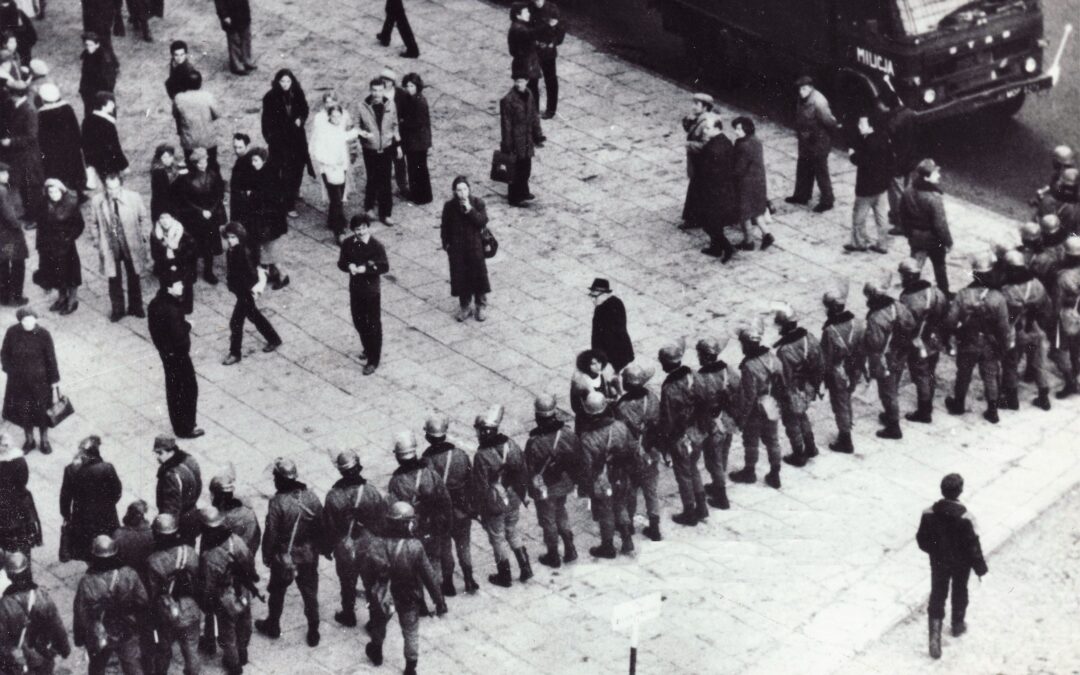Poland’s government wants to introduce special benefits for those who were active in opposition to Poland’s communist system before 1989 and who faced political persecution by the regime.
Under legislation that was submitted by the prime minister to parliament this week, such individuals will receive a guaranteed minimum state pension of 2,400 zloty (€545) per month as well as other benefits, including reduced fares for public transport.
“It is our duty to provide people who fought for our freedom and independence with a dignified standard of living,” says Prime Minister Mateusz Morawiecki, quoted by Niezależna.pl.
Morawiecki himself was active in underground anti-communist activity in the 1980s, including as part of the Fighting Solidarity movement founded by his late father, Kornel. The younger Morawkiecki has previously described how he was repeatedly detained and beaten by the communist security services.
W czerwcu 1982 r.we Wrocławiu działacze podziemnej Solidarności powołali antykomunistyczną Solidarność Walczącą.Przew. został Kornel Morawiecki.Cel całkowite odsunięcie komuny od władzy.Pan Premier Mateusz jako działacz SW do dziś realizuje postulaty zasłużonej organizacji. pic.twitter.com/nkFkT7wbgi
— Piotr Przybyłowski🇵🇱 (@przyby_piotr) July 1, 2020
Morawiecki stressed that without the sacrifices of such activists, the Poland of today would not exist. The new law will finally be a way to show appreciation.
“The courage and persistence in the fight for the freedom of Poland had its price,” tweeted the prime minister. “Many paid for this [by facing] persecution and losing their health. Today our homeland has a chance to make up for those wrongdoings, at least partially.”
The new benefits will apply to the 12,000 or so people who are officially recognised as having been opposition activists or having been repressed for political reasons in the period 1956-1989. (Those who fought on behalf of Poland in 1939-56 hold a separate war veteran status.)
Those with old-age or disability pensions below 2,400 zloty will have it topped up to that figure, reports Money.pl. They will also be granted 50% discounts on the cost of public transport and domestic train or coach travel.
The Office for War Veterans and Victims of Oppression will also be able to pay health insurance contributions for those who are not currently covered.
Assuming the legislation passes parliament – where the ruling Law and Justice (PiS) party have a majority in the decisive lower house – and is signed by President Andrzej Duda, a PiS ally, it is expected to go into force in the autumn. Its estimated annual cost is 61-62 million zloty (around €14 million).
“I feel that there can never be too much help for these people,” Waldemar Buda, a deputy minister for development funds and regional policy, told Money.pl. “Not everyone is aware how much we owe them.”
Buda noted that many opponents of the communist regime lost jobs or were demoted as a consequence of their actions. “These are now elderly people, whose pensions are often lower than they should be,” he added.
“Just as we have taken away the high pensions of all members of the SB [the communist-era security services], we are making up for the lost years of the opposition members now” said Buda.
After coming to power in late 2015, PiS fulfilled an election promise by decreeing that the pensions of former members of the communist security services could be no higher than the average state pension of 2,100 zloty a month. When the law was passed three years ago, almost 40,000 pensioners saw their payments lowered.
The move was part of a broader “de-communisation” policy by PiS, which argues that after 1989 there was not a tough enough reckoning with Poland’s communist past and that many “post-communists” managed to remain in influential positions.
Some have criticised measures such as reducing pensions and removing police officers who served under communism, arguing that they are based on the idea of collective responsibility rather than an assessment of individual actions.
There have also been legal challenges against the decisions, with Poland’s Supreme Administrative Court finding that “the regulations are imprecise and allow a significant degree of discretion in their application”. As a result, rulings of lower-level courts in very similar cases are often contradictory, with some restoring the reduced pensions and others not, reports Gazeta.pl.
PiS has also been accused of hypocrisy, given that it has included former communist officials in its own ranks, such as Stanisław Piotrowicz, a state prosecutor during martial law who was involved in a case against an opposition activist and was decorated by the communist authorities.
Piotrowicz later went on to serve as a PiS senator and MP for 14 years before being nominated by the party as a Constitutional Tribunal Judge last year.
Main image credit: Jarek Tuszynski/Wikimedia Commons (under public domain)

Agnieszka Wądołowska is deputy editor-in-chief of Notes from Poland. She is a member of the European Press Prize’s preparatory committee. She was 2022 Fellow at the Entrepreneurial Journalism Creators Program at City University of New York. In 2024, she graduated from the Advanced Leadership Programme for Top Talents at the Center for Leadership. She has previously contributed to Gazeta Wyborcza, Wysokie Obcasy and Duży Format.




















